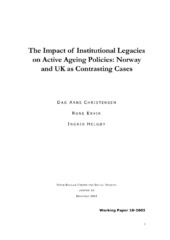| dc.contributor.author | Christensen, Dag Arne | eng |
| dc.contributor.author | Ervik, Rune | eng |
| dc.contributor.author | Helgøy, Ingrid | eng |
| dc.date.accessioned | 2006-06-21T15:19:54Z | |
| dc.date.accessioned | 2020-12-10T06:31:55Z | |
| dc.date.available | 2006-06-21T15:19:54Z | |
| dc.date.available | 2020-12-10T06:31:55Z | |
| dc.date.issued | 2003-12 | eng |
| dc.identifier.issn | 1503-0946 | |
| dc.identifier.uri | https://hdl.handle.net/1956/1389 | |
| dc.description.abstract | Increasingly international organisations, national governments and social actors all over the Western world have embraced the concept of «active ageing». The associated policy packages are seen as better ways to address the demographic ageing challenge than relying on either conventional welfare state institutions or market incentives and by this opening up for a much broader or holistic policy agenda. Given the positive connotations and seemingly uncontested nature of this concept there is all the more reason to be alert for social scientists. The empirical focus is on the Norwegian case, but we contrast this against the British case. The Norwegian case is interesting because its long and strong tradition of full employment policy. Hence ‘active’ economic participation has been a precondition for broad based and fairly generous welfare arrangements and the broad tax base on which this rest. In addition, policy making in Norway has been labelled democratic corporatism, and we are in Wilensky’s terminology, dealing with a consensus-making machine (Wilensky 2002). The UK represents a different welfare state regime and type of political economy. Thus a central topic of our paper will be how these different institutional legacies of the two countries impact their respective paths taken toward active ageing policies. Active ageing concerns a broad spectrum of human activities and public policies. In this paper however the main focus will be on labour market policies. Within the Norwegian case the labour market is the core agenda where policy formulation is taking place together with pension policy. The paper is structured as follows: First we map the demographic and social challenges within the Norwegian context and briefly compare these with that of the UK. In the second section we formulate a framework for analysing active ageing policies. In this section we also include a critical account of the Active Ageing concept, and show how the diverse application invoked by different international organisations gives different normative implications. Then we present an empirical description of active ageing policies in Norway with focus on labour market policy, and contrast this against UK policies. Our intention is firstly to demonstrate that different types of welfare states and political economies will adhere and promote different conceptualisations and policies of active aging. Secondly we critically will explore which normative implications each countries conceptualisations and policies is reflecting. | en_US |
| dc.description.abstract | I aukande grad har internasjonale organisasjonar, nasjonale regjeringar og sosiale aktørar i den vestlege verda omfamna omgrepet ’aktiv aldring’ (active ageing). Dei tilhøyrande politikk pakkane vert sett som betre måtar å adressere den demografiske aldringsutfordringa enn både konvensjonelle velferdsstatlege institusjonar og marknads incentiv. På denne måten kan aktiv aldring seiast å opne opp for ein breiare eller meir holistisk politisk dagsorden. Gitt desse positive konnotasjonane og den tilsynelatande ikkje-omstridde naturen til dette omgrepet, så er det all grunn for samfunnsforskarar til å vere på vakt og stille seg kritisk, noko vi vil gjere i dette paperet. Det empiriske fokuset vil vere på norske tilhøve , men vi kontrasterer dette med den britiske situasjonen. Noreg er av interesse fordi vi her har hatt ein lang og sterk tradisjon for full sysselsetjing. Med andre ord ’aktiv’ økonomisk deltaking har vore ein føresetnad for breie inkluderande/universelle og rimeleg sjenerøse velferdsordningar og det breie skattegrunnlaget desse kviler på. I tillegg er politikkutforminga i Noreg karakterisert ved demokratisk korporativisme og i Wilensky sin terminologi, har vi å gjere med ei konsensus-dannande maskin (Wilensky 2002). Storbritannia representerer både eit anna velferdsregime og ein annan type politisk økonomi. Eit hovudmål for dette arbeidet er å syne korleis desse ulike institusjonelle arvane til dei to landa gjev føringar på utforminga av aktiv aldringspolitikk i dei to landa. Den andre intensjonen er å syne korleis ulik forståing av omgrepet aktiv aldring og ulik politikkutforming har viktige normative implikasjonar i høve til forståing av og konsekvensar for til dømes individuell valfridom og rettferd. | no |
| dc.format.extent | 496451 bytes | eng |
| dc.format.mimetype | application/pdf | eng |
| dc.language.iso | eng | eng |
| dc.publisher | Stein Rokkan Centre for Social Studies | eng |
| dc.relation.ispartofseries | 18-2003 | |
| dc.relation.ispartofseries | Working Paper | en |
| dc.title | The Impact of Institutional Legacies on Active Ageing Policies: Norway and UK as Contrasting Cases | eng |
| dc.type | Working paper | eng |
| dc.subject.nsi | VDP::Samfunnsvitenskap: 200 | nob |
